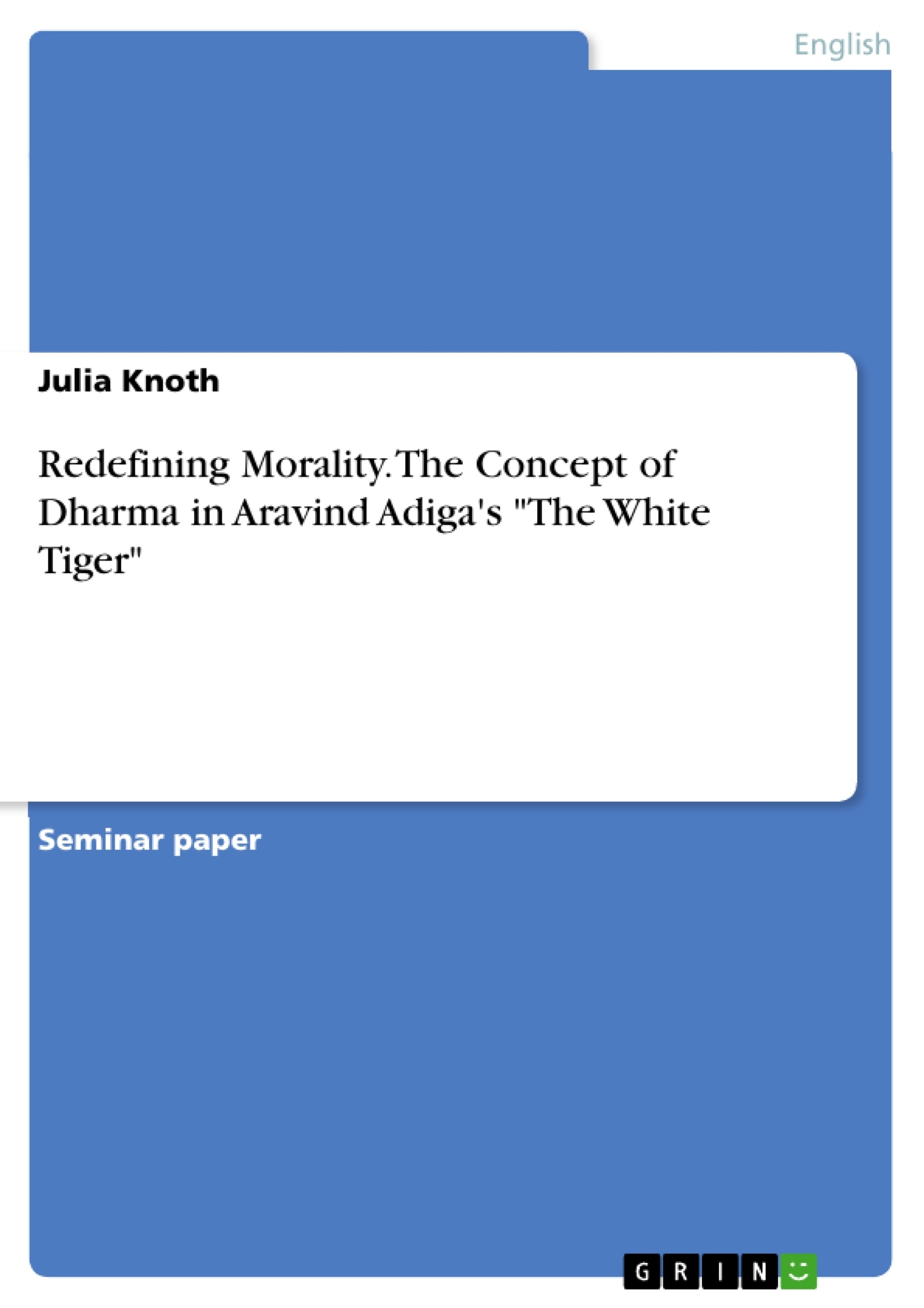The guiding question of this paper is how Balram justifies his criminal acts and on which moral concept he bases his decisions. In the course of this paper, I will attempt to show that the protagonist is a gritty anti-hero who does not act in accordance to dharma and reinvents his own concept of morality. The first chapter will give a brief explanation of dharma, one of the four purushartas, a significant concept in Indian philosophy, especially in Hinduism when talking about morality. “Dharma is inextricably linked with the ethos of India and the entire personal, social, ecological, and spiritual life is guided by it for ultimate liberation” (Mathew, 2015:131). In the following chapter, the criminal acts committed by the protagonist and the circumstances and reasons leading to it will be analyzed in terms of morality, taking the concept of dharma into consideration. This chapter underlies the difficulty of how to cope with the paradox issue of the protagonist being a murderer and a victim at the same time. Subsequently, the strategies employed by the protagonist to justify his immoral acts will be discussed in detail, attempting to find out how Balram distinguishes between right and wrong. Firstly, the depiction of other humans in the novel will be examined since the narrator strategically portrays them as being immoral and corrupt in order to comparatively put himself on a higher level. Secondly, his heroic self-image will be analyzed, considering his name 'the white tiger'. The third subchapter will focus on how the protagonist employs the metaphor of the rooster coop as a justification for the murder, taking the consequences of the murder into account and discussing Balram's ultimate aims.
Table of Contents
- Introduction
- Morality in India and the Concept of Dharma.
- Breaking moral conventions - Balram's illegal acts
- Redefining Morality
- Negative portrayal of fellow humans
- Heroic self-image.
- Breaking out of the Rooster Coop..........\n
- Conclusion.
Objectives and Key Themes
This paper investigates the moral framework of Balram Halwai, the protagonist in Aravind Adiga's novel, The White Tiger. The central question is how Balram justifies his criminal acts and the moral concept underpinning his decisions. The paper aims to demonstrate that Balram, a gritty anti-hero, deviates from the traditional concept of dharma, forging his own interpretation of morality.
- The concept of dharma in Indian philosophy and its implications for morality.
- The portrayal of Balram's illegal acts and their connection to the concept of dharma.
- Balram's strategies for justifying his immoral acts.
- The protagonist's negative portrayal of other characters and his construction of a heroic self-image.
- The use of metaphors, specifically the "rooster coop" metaphor, as a justification for Balram's actions.
Chapter Summaries
- The introduction presents the context of The White Tiger within contemporary Indian society, highlighting its critique of existing inequalities. The novel's protagonist, Balram, a member of the lower caste, rises to entrepreneurial success through acts of violence, defying the constraints of the caste system. The paper aims to analyze how Balram justifies his actions and the moral foundation of his choices.
- Chapter 2 examines the concept of dharma within Indian philosophy, highlighting its importance in understanding moral values and defining "right" behavior. The chapter discusses the ambiguity of dharma and the difficulty of defining it explicitly, drawing upon the work of Doninger and Derrett. The concept of dharma is further linked to the fulfillment of duties and the motivation of one's actions, as well as the interplay of prescription and prohibition. It contrasts Western and Eastern perspectives on duty, highlighting the inherent sense of duty in Eastern thought.
Keywords
The key terms and concepts explored in this paper include: Aravind Adiga's The White Tiger, dharma, morality, anti-hero, caste system, India, social inequality, economic boom, justifications, self-image, metaphors, rooster coop.
- Citar trabajo
- Julia Knoth (Autor), 2016, Redefining Morality. The Concept of Dharma in Aravind Adiga's "The White Tiger", Múnich, GRIN Verlag, https://www.grin.com/document/423922



